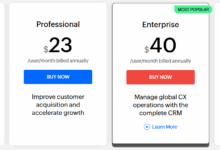Affordable CRM Software For Startups: Streamlining Operations And Boosting Growth
Affordable CRM Software for Startups opens the door to efficient management and accelerated growth in the competitive business landscape. Dive into the world of cost-effective CRM solutions tailored to suit the unique needs of budding entrepreneurs.
Explore essential features, customization options, integration possibilities, and more as we unravel the potential of CRM software for startups.
Exploring Features of HubSpot CRM
HubSpot CRM is a popular choice for startups looking to streamline their sales, marketing, and customer service processes. With a user-friendly interface and robust features, HubSpot CRM offers various tools to help startups effectively manage their customer relationships.
Key Features of HubSpot CRM
- Customizable sales pipelines to track deals and progress
- Contact management for organizing customer information
- Email tracking and templates for personalized communication
- Integration with marketing tools for seamless lead generation
- Reporting and analytics to track performance and make data-driven decisions
Pricing Plans and Recommendations
- HubSpot CRM offers a free plan with basic features to get started
- For growing startups, the Starter plan provides additional functionality at an affordable price
- The Professional and Enterprise plans offer more advanced features for larger teams and businesses
- Based on the needs of a growing startup, the Starter plan is recommended for a good balance of features and affordability
Features to Look for in Affordable CRM Software
When choosing CRM software for your startup, it’s essential to consider the features that will help streamline operations and improve customer interactions. Here are some key features to look for:
Data Management and Organization
- Centralized database to store all customer information
- Ability to segment and categorize leads and contacts
- Data import/export capabilities for easy data management
Automation and Workflow
- Automated lead scoring and assignment
- Email automation for personalized communication
- Workflow automation to streamline processes and tasks
Integration and Customization
- Integration with other tools and software used by your startup
- Customizable fields and layouts to fit your specific business needs
- API access for further customization and extension
Reporting and Analytics
- Real-time reporting on sales performance and customer interactions
- Customizable dashboards for quick insights and data visualization
- Forecasting tools to predict future sales trends
Cost-effective CRM Solutions for Startups
Startups often operate on tight budgets, making it crucial to find cost-effective CRM solutions that offer value without breaking the bank. Here are some tips and strategies to help startups navigate the world of CRM software:
Finding Cost-effective CRM Solutions within a Startup Budget
When looking for cost-effective CRM solutions, startups should consider opting for cloud-based platforms that offer subscription-based pricing models. These models allow startups to pay a monthly fee rather than a hefty upfront cost, making it easier to manage cash flow.
Pricing Models Commonly Used by CRM Software Providers
- Subscription-based pricing: Pay a monthly or annual fee for access to the CRM software.
- Per-user pricing: Cost is based on the number of users who will be using the CRM software.
- Custom pricing: Tailored packages based on specific business needs and usage requirements.
Negotiating Better Deals or Discounts on CRM Software Subscriptions
Startups can negotiate better deals on CRM software subscriptions by leveraging free trials, asking for discounts on annual payments, or exploring bundle packages that include additional features at a discounted rate. It’s also worth reaching out to CRM providers directly to discuss pricing options.
Key Features to Prioritize When Selecting a CRM Solution
- Lead management and tracking capabilities
- Customizable dashboards and reports
- Integration with other business tools and software
- Automation of repetitive tasks
Comparison Chart of CRM Software Options
| CRM Software | Pricing | Key Features | Customer Reviews |
|---|---|---|---|
| HubSpot CRM | Freemium model with paid add-ons | Lead scoring, email tracking, pipeline management | Positive reviews for user-friendly interface |
| Zoho CRM | Starting at $12/user/month | Sales forecasting, workflow automation, social CRM | High ratings for affordability and scalability |
| Salesforce CRM | Starting at $25/user/month | Advanced analytics, AI-powered insights, customization options | Well-regarded for enterprise-level features |
Integrating CRM Software into Existing Systems Effectively
Startups can effectively integrate CRM software into their existing systems by ensuring seamless data migration, providing comprehensive training to employees, and setting clear objectives for CRM implementation. It’s essential to choose a CRM solution that aligns with the startup’s current workflows and processes.
Customizing CRM Solutions to Suit Specific Business Needs
Startups can customize CRM solutions by tailoring workflows, fields, and reports to meet their specific business requirements. By defining custom fields, automating processes, and setting up personalized dashboards, startups can optimize their CRM system for maximum efficiency.
Insights on Scalability of CRM Solutions for Startup Growth
When selecting a CRM solution, startups should consider the scalability of the software to accommodate growth. Look for CRM platforms that offer flexible pricing plans, scalability options, and seamless integration with other business tools to support the startup’s expansion and evolving needs.
Customization and Scalability of CRM Software
In the realm of CRM software, customization and scalability are crucial aspects for startups looking to optimize their operations and foster growth.
Importance of Customizable CRM Solutions for Startups
Customizable CRM solutions allow startups to tailor the software to meet their specific needs and workflows. By customizing fields, workflows, and reports, startups can ensure that the CRM system aligns perfectly with their business processes.
Examples of Tailoring CRM Software for Startups
- Creating custom fields to capture unique data points relevant to the startup’s industry
- Configuring automated workflows to streamline sales processes
- Designing personalized dashboards to track key metrics and performance indicators
Scalability of CRM Software and Its Impact on Business Growth
Scalability in CRM software refers to the ability to accommodate growth in data, users, and functionalities as the startup expands. A scalable CRM system can support the increasing demands of a growing business without compromising performance or efficiency.
Customizing CRM Software for Different Departments
Startups can customize CRM software to suit the specific requirements of different departments, such as sales, marketing, and customer service. Each department can have its own set of custom fields, workflows, and reports tailored to their unique needs.
Benefits of Customized CRM Software vs. Off-the-Shelf Solutions
- Customized CRM software offers a tailored solution that perfectly fits the startup’s operations
- Off-the-shelf CRM software may require workarounds or compromises to align with the startup’s processes
- Customized CRM solutions can provide a competitive advantage by offering unique capabilities that meet specific business requirements
Role of Integrations in Enhancing CRM Software Scalability
Integrations with other tools and platforms play a vital role in enhancing the scalability of CRM software for startups. By connecting CRM with marketing automation, e-commerce, or analytics tools, startups can create a unified ecosystem that streamlines processes and data flow.
Integrations with Other Tools and Platforms
In today’s digital business landscape, the ability of CRM software to seamlessly integrate with other tools and platforms is crucial for startups to streamline their operations, enhance productivity, and improve customer relationships. Let’s delve into the significance of CRM software integrations with other business tools and explore some common integrations that startups may find useful for their daily operations.
Common Integrations for Startups
Integrating CRM software with other tools can help startups automate repetitive tasks, improve data accuracy, and provide a unified view of customer interactions. Some common integrations that startups may find beneficial include:
- Integration with Email Marketing Platforms: Connecting your CRM software with email marketing tools like Mailchimp or Constant Contact can help startups create targeted email campaigns based on customer data stored in the CRM system.
- Integration with E-commerce Platforms: Integrating CRM software with e-commerce platforms such as Shopify or WooCommerce enables startups to track customer purchases, preferences, and behavior to personalize marketing efforts.
- Integration with Helpdesk Software: Connecting CRM with helpdesk solutions like Zendesk or Freshdesk allows startups to provide timely and personalized customer support by accessing customer information and interaction history.
Best Practices for Seamless Integration
When integrating CRM software with existing systems, startups should consider the following best practices to ensure a smooth and efficient process:
- Define Integration Goals: Clearly outline the objectives and expected outcomes of the integration process to align it with business goals and maximize its benefits.
- Choose Compatible Tools: Select tools and platforms that are compatible with your CRM software to facilitate seamless data exchange and minimize integration challenges.
- Ensure Data Security: Implement robust security measures to protect sensitive customer data during the integration process and maintain compliance with data privacy regulations.
- Train Staff: Provide comprehensive training to employees on how to effectively use the integrated systems to leverage the full potential of CRM software and other tools.
User-Friendly Interface and Ease of Use
Having a user-friendly interface in CRM software is crucial for startups as it ensures smooth adoption and efficient utilization of the system. A complicated interface can lead to frustration among users and hinder productivity. Here are some key points to consider when evaluating the ease of use of different CRM software options.
Key Elements for Evaluating Ease of Use
- Intuitive Navigation: Look for software with simple and clear navigation menus to help users find what they need quickly.
- Customization Options: The ability to customize the interface to suit the specific needs of your startup can enhance user experience.
- Mobile Compatibility: A CRM system that is optimized for mobile devices allows users to access information on the go, increasing flexibility.
- Visual Design: Clean and visually appealing design contributes to a positive user experience and makes the software more engaging.
Role of User Experience (UX) Design
Effective UX design plays a significant role in the usability of CRM software. It focuses on creating interfaces that are easy to navigate, visually appealing, and intuitive for users. A well-designed interface can streamline processes, minimize errors, and improve overall user satisfaction.
Efficiency of Onboarding Processes
Software with a good interface typically has a smoother onboarding process, making it easier for users to get started and understand how to use the system effectively. In contrast, systems with poor interfaces may have a steep learning curve, leading to delays and inefficiencies in the onboarding process.
Checklist for Assessing User-Friendliness
- Intuitive navigation and layout
- Customization options for personalization
- Mobile compatibility for on-the-go access
- Visual design that is clean and engaging
- Efficient onboarding process for quick adoption
Data Security and Privacy Considerations
When choosing a CRM software for your startup, it is crucial to prioritize data security and privacy. Protecting sensitive customer information is not only important for building trust with your clients but also for complying with data protection regulations.
Features for Data Protection
- Encryption: Look for CRM software that offers end-to-end encryption to secure data both in transit and at rest.
- Access Controls: Implement strict access controls to ensure that only authorized personnel can view or manipulate sensitive data.
- Regular Audits: Choose a CRM system that conducts regular security audits to identify and address any vulnerabilities.
- Data Backup and Recovery: Opt for software that provides automatic data backup and easy recovery options in case of data loss or breaches.
Tips for Securing Customer Information
- Train Employees: Educate your team on best practices for data security and privacy to prevent internal breaches.
- Use Multi-Factor Authentication: Enable multi-factor authentication to add an extra layer of security for accessing the CRM system.
- Regular Updates: Ensure that your CRM software is regularly updated with the latest security patches to protect against new threats.
- Monitor User Activity: Keep track of user activity within the CRM system to detect any suspicious behavior or unauthorized access.
Training and Support for CRM Software Implementation
Training and support services are crucial when implementing CRM software for startups. These services ensure that teams are equipped with the necessary knowledge and skills to effectively use the CRM software, maximizing its benefits for the business.
Recommendations for Effective CRM Software Training
- Start with a comprehensive onboarding process to familiarize team members with the CRM software.
- Provide hands-on training sessions to allow users to practice using the software in real-world scenarios.
- Offer regular refresher courses and advanced training for users to deepen their understanding of the CRM software.
Availability of Customer Support Options
- 24/7 customer support via phone, email, or live chat for immediate assistance with any issues or questions.
- Access to online knowledge bases, tutorials, and forums for self-help resources and troubleshooting guidance.
- Dedicated account managers or support teams for personalized support and guidance throughout the CRM software implementation process.
Setting Up a Training Program for CRM Software Implementation
- Identify training goals and objectives based on the specific needs and requirements of the startup.
- Develop training materials, including manuals, videos, and interactive modules, tailored to the CRM software features and functionalities.
- Conduct training sessions in a structured manner, starting with basic concepts and gradually progressing to advanced topics.
- Evaluate training effectiveness through assessments, feedback surveys, and performance reviews to measure user proficiency and knowledge retention.
Comparison Table of Training Methods for CRM Software Users
| Training Method | Description | Benefits |
|---|---|---|
| Onsite Training | Face-to-face training sessions conducted at the startup’s premises. | Interactive learning experience, personalized guidance, and immediate feedback. |
| Online Training | Virtual training sessions delivered remotely via webinars or e-learning platforms. | Flexible scheduling, cost-effective, and accessible from anywhere with an internet connection. |
Troubleshooting Guide for CRM Software Implementation
- Identify common issues such as data migration errors, user access problems, or integration issues.
- Provide step-by-step solutions or workarounds for each issue, including screenshots or video tutorials for visual guidance.
- Create a dedicated support channel for users to report and escalate issues for timely resolution.
Key Performance Indicators (KPIs) for CRM Software Training
- User Adoption Rate: Measure the percentage of team members actively using the CRM software after training.
- Data Accuracy: Monitor the quality of data input and management within the CRM system post-training.
- Customer Engagement: Track customer interactions and engagement levels to assess the impact of CRM software training on customer relationships.
Mobile Accessibility and Remote Work Capabilities
Mobile accessibility is crucial for startups with remote teams as it allows employees to access important customer data, communicate with team members, and manage tasks even when they are not in the office. Having a CRM software with robust mobile features can greatly benefit startups on the go by enabling them to stay connected and productive regardless of their location.
Benefits of CRM Software with Mobile Apps
- Access to real-time customer information: Mobile CRM apps provide employees with instant access to customer data, allowing them to quickly respond to inquiries and provide personalized service on the go.
- Enhanced collaboration: With mobile accessibility, remote teams can easily collaborate and share information, ensuring everyone is on the same page and working towards common goals.
- Increased efficiency: By being able to update and access CRM data from anywhere, employees can work more efficiently and make informed decisions without being tied to a desk.
Examples of CRM Software with Strong Mobile Features
- HubSpot CRM: HubSpot offers a mobile app that allows users to manage contacts, track deals, and access analytics on the go, making it easier for startups to stay organized and productive.
- Salesforce Mobile: Salesforce’s mobile app provides a comprehensive CRM solution, enabling users to manage leads, opportunities, and customer interactions from their smartphones or tablets.
- Zoho CRM: Zoho’s mobile app offers a user-friendly interface and robust features for managing customer information, sales activities, and marketing campaigns remotely.
Reporting and Analytics Features in CRM Software
Reporting and analytics tools integrated into CRM software provide valuable insights for startups to make informed decisions and optimize their operations.
The Value of Reporting and Analytics in CRM Software
Reporting and analytics features in CRM software allow startups to track and analyze key metrics, such as sales performance, customer engagement, and marketing effectiveness. By generating reports and visualizing data, startups can identify trends, patterns, and areas for improvement.
Data Insights for Decision-Making
- Startups can leverage CRM analytics to understand customer behavior, preferences, and buying patterns.
- By analyzing data on customer interactions and sales activities, startups can tailor their marketing strategies and sales efforts to meet customer needs effectively.
- Tracking customer retention rates and lifetime value can help startups focus on building long-term relationships and maximizing revenue.
Key Performance Indicators for Startups
- Conversion rates: Monitoring the percentage of leads that convert into customers can help startups assess the effectiveness of their sales and marketing efforts.
- Customer acquisition cost: Calculating the cost of acquiring a new customer versus the revenue generated can help startups determine the return on investment for their marketing campaigns.
- Customer satisfaction: Measuring customer satisfaction levels through feedback and surveys can help startups improve their products and services to meet customer expectations.
Customer Support and Feedback Management
Customer support and feedback management are crucial aspects of any business, especially for startups looking to build strong relationships with their customers. CRM software plays a vital role in streamlining customer support interactions and collecting valuable feedback to enhance customer satisfaction.
Managing Customer Support Interactions
- CRM software helps startups centralize customer inquiries, complaints, and requests for efficient resolution.
- It enables tracking of customer interactions, ensuring timely responses and personalized support.
- By maintaining a complete history of customer support interactions, startups can deliver consistent service across all touchpoints.
Collecting and Analyzing Customer Feedback
- Startups can use CRM software to create surveys, feedback forms, and polls to gather customer opinions and suggestions.
- By analyzing feedback data, startups can identify areas for improvement and implement changes to enhance the overall customer experience.
- Integrating feedback data with CRM software provides a holistic view of customer preferences and sentiments.
Improving Customer Satisfaction through CRM Solutions
- By leveraging CRM analytics, startups can identify trends in customer feedback and proactively address issues before they escalate.
- Personalizing customer support based on CRM data insights can lead to increased customer satisfaction and loyalty.
- Implementing automated feedback collection processes within CRM software streamlines the feedback loop and ensures continuous improvement.
Case Studies
In the following section, we will delve into real-life examples of startups that have successfully implemented CRM software to drive growth and improve efficiency.
Startup A: XYZ Tech Solutions
- XYZ Tech Solutions, a startup in the tech industry, implemented HubSpot CRM to streamline their sales and marketing processes.
- Challenges faced included data migration and training employees on the new system.
- After CRM implementation, XYZ Tech Solutions saw a 30% increase in lead conversion rates and a 20% reduction in sales cycle length.
- Key takeaway: Proper training and ongoing support are essential for successful CRM adoption.
Startup B: Eco-Friendly Living
- Eco-Friendly Living, a startup focused on sustainable products, opted for Zoho CRM to manage customer relationships and track sales performance.
- One of the challenges encountered was customizing the CRM to suit their unique business requirements.
- Post-CRM implementation, Eco-Friendly Living experienced a 25% increase in customer retention and a 40% improvement in sales team productivity.
- Lesson learned: Choosing a CRM that allows for customization is crucial for aligning with specific business needs.
Startup C: Foodie Haven
- Foodie Haven, a startup in the food industry, integrated Salesforce CRM to manage customer data and track marketing campaigns.
- Overcoming initial resistance from employees towards adopting the new system was a significant challenge faced by Foodie Haven.
- Following CRM implementation, Foodie Haven witnessed a 15% increase in customer satisfaction and a 30% boost in cross-selling opportunities.
- Takeaway: Effective change management strategies are vital for ensuring successful CRM implementation.
Performance Improvements Post-CRM Implementation
Chart showcasing the percentage increase in key metrics such as lead conversion rates, customer retention, and sales team productivity post-CRM implementation across the three startups.
Industry-Specific CRM Solutions for Startup Verticals
Industry-specific CRM solutions are tailored to meet the unique needs of startups operating in various sectors such as e-commerce, SaaS, healthcare, and more. These specialized CRM software options can offer targeted features and functionalities that cater to the specific requirements of different industries.
E-commerce CRM Solutions
- Integration with popular e-commerce platforms like Shopify and Magento
- Automated order processing and customer segmentation based on purchase history
- Abandoned cart recovery and personalized product recommendations
SaaS CRM Solutions
- Subscription management and recurring billing capabilities
- Customer onboarding workflows and product usage analytics
- Integration with helpdesk software for seamless customer support
Healthcare CRM Solutions
- HIPAA-compliant data security measures and patient information protection
- Appointment scheduling and electronic medical record (EMR) integration
- Automated patient communication and follow-up reminders
Future Trends in CRM Software for Startups
In the rapidly evolving world of technology, it is essential for startups to stay ahead of the curve when it comes to CRM software. By predicting and adapting to future trends, startups can gain a competitive edge and foster strong customer relationships.
AI and Automation in CRM Solutions
AI and automation are revolutionizing CRM software by streamlining processes, improving customer interactions, and providing valuable insights. Startups can leverage AI-powered chatbots for customer support, automate repetitive tasks, and analyze data to personalize customer experiences.
Data Analytics for CRM Optimization
Data analytics play a crucial role in optimizing CRM processes for startups. By analyzing customer data, startups can identify trends, forecast sales, and tailor marketing strategies. Implementing analytics tools in CRM software can lead to data-driven decision-making and improved customer engagement.
Cloud-Based CRM Systems for Startup Operations
Cloud-based CRM systems offer scalability, flexibility, and cost-effectiveness for startups. By moving CRM operations to the cloud, startups can access real-time data, collaborate remotely, and ensure data security. Cloud-based solutions enable startups to focus on growth without worrying about infrastructure maintenance.
Successful CRM Strategies by Startups
Startups like Airbnb and Slack have successfully implemented CRM strategies to scale their businesses and enhance customer relationships. These companies focus on personalization, automation, and continuous improvement to deliver exceptional customer experiences. By learning from their success stories, startups can tailor their CRM strategies for growth and success.
Comparing CRM Software Options for Startups
When choosing CRM software, startups should consider factors like customization, scalability, integration capabilities, and pricing. Popular options like Salesforce, Zoho CRM, and Freshworks CRM offer diverse features to meet the unique needs of startups. By comparing and contrasting different CRM software options, startups can find the best fit for their business goals.
Implementation Strategies for Adopting CRM Software
Implementing CRM software effectively is crucial for startups to streamline their customer relationship management processes and drive growth. Here is a step-by-step guide on how to successfully adopt CRM software and maximize its benefits:
Assess Your Business Needs and Goals
- Identify key pain points in your current CRM processes
- Define clear objectives for implementing CRM software
- Ensure alignment with your business goals and overall strategy
Choose the Right CRM Software
- Research and compare different CRM solutions based on your requirements
- Consider factors like customization options, scalability, integrations, and pricing
- Select a CRM platform that best fits your startup’s needs and budget
Plan and Prepare for Implementation
- Develop a detailed implementation plan with timelines and milestones
- Allocate resources and assign responsibilities to team members
- Provide training and support to ensure smooth transition and adoption
Data Migration and Integration
- Transfer existing customer data to the new CRM system accurately
- Integrate CRM software with other tools and platforms used in your startup
- Ensure data consistency and integrity throughout the migration process
Monitor Performance and Make Adjustments
- Track key performance metrics and analyze data generated by the CRM software
- Gather feedback from users and make necessary adjustments to optimize usage
- Continuously improve and refine your CRM processes for better results
Final Thoughts
In conclusion, Affordable CRM Software for Startups offers a strategic advantage by enhancing customer interactions, optimizing workflows, and ensuring data security. Embrace the power of CRM technology to propel your startup towards success in today’s dynamic market environment.






